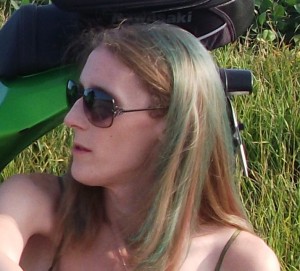Rhiannon Catherwood
When I was ten years old, I ran away by accident. Every day at recess, I sought out the same secluded alcove in the outer wall of the school. I would sit, take out a spiral notebook, and write, relying on a plastic digital watch to let me know when my thirty minutes were up. The day the watch stopped working, I relied on my ears instead. Sooner or later, I knew I would hear the voices fade, the screeching of the swings slow and stretch into nothing, and then I would chase after my class. Two hours of consistent activity went by before I realized that classes came out in shifts, that my own had gone back inside a long time ago and that my teacher must have had no idea where I was. I was officially a missing person.
My belly hollowed. I wondered, had they already called my parents? Were they furious or were they just terrified? In my mind, my mother was crying. Was I too late to stop them from sending search parties to look for me? I imagined dogs dragging officers through the woods beyond the field, helicopters circling overhead, suspended by their translucent haloes. I considered making a break for it like in The Fugitive.
Deciding there was nothing to do but face the music, I stole back inside and wormed through the halls, trying to come up with a convincing story about where I was before opening the door to my classroom. Nothing came to mind. I was going to get yelled at, and I was finally going to find out what happened in a “detention.”
My teacher noticed me walk in. I scanned her paler-than-usual face for anger or relief but saw something else that I couldn’t quite make sense of at the time. She glanced around the room before looking back to me, and she didn’t say anything for several heartbeats. Finally, she told me to get with my group and take out my multiplication tables.
I didn’t know how, and I didn’t care why—I’d gotten away scot-free.
◊ ◊ ◊
Fifteen years later, I found myself looking at elementary school report cards with a name that wasn’t mine anymore. My dad had recently retired and decided to sell the house I grew up in and move in with my partner and me. I spent a day cleaning out his basement, breathing in a musty smell as I sifted and peeled through the waterlogged relics of a childhood that felt so distant that it could have been someone else’s—someone who liked to draw very, very badly, filled spiral notebooks with epic fantasies, and according to his teachers was “bright and independent,” “quiet but friendly,” and “no trouble at all.” My parents’ son.
I couldn’t help but feel fortunate that if my father ever had any compunctions about his son growing up to be a transsexual lesbian, he certainly never let on. It was possible that he accepted my transition so easily because on some subconscious level, he already knew. Part of me wondered how anyone could have missed it.
Underneath the report cards and a few additional strata of folders and spirals rested a homework assignment from my kindergarten days. To practise printing—and I sorely needed practice—we were to write down words and sentences we heard in whatever TV shows and movies we watched. I’d chosen to scrawl down every single line of “Part of Your World” from The Little Mermaid, a song which to this day brings me to tears. As an adult and a feminist, of course I understand the criticism of a film that implies it makes perfect sense to abandon your family, change yourself, and give up your greatest talent, all for some goofy dude who keeps drowning all over the place. But as a child, the soggy prince seemed borderline irrelevant. To me, this was a story about a girl living a life she didn’t want, confined by a body she didn’t want. She collected stray artifacts from the other side and hid them away so that no one would know. The only way out was to get a body that fit, but it meant giving up an awful lot in the process. Yeah, I knew what this story was really about.
Seriously—how could you miss it?
But the reality is, everyone did miss it. My parents, my brother and sisters, my friends—none had seen my transition coming. I don’t blame them. How would they know what to look for? Even the learned experts, the trained psychoanalysts who dedicate their careers to the study of this peculiar sex/gender phenomenon, have spent the last century banging their heads against the wall to come up with a solid set of diagnostic criteria to justify recommending drastic surgery to treat a medical problem with no physical symptoms whatsoever. Something more substantial, I suppose, than that the patient insists she’s really, really sure. Maybe it’s a doctor’s job to be skeptical—I don’t blame them either.
At that time, in fact—when I’d adopted a new name and a new life, when my body was finally cured of testosterone and flush with estrogen, when everything but one last puzzle piece was in place—I first experienced my own doubts.
I was reluctantly on the hunt for a pair of good psychologists—most reputable surgeons require two letters of recommendation before they will turn you outside in. I wasn’t looking forward to seeing them. I had only been to a therapist once before, briefly, years earlier. As I recall, I would tell him that I was feeling frustrated, and in his most caring voice, he would tell me he was hearing that I was feeling frustrated. It was like talking to a very well-intentioned Furby.
But it wasn’t my hypothetical future psychologists’ lack of any real input that concerned me, but rather that they would have input, and that they would tell me that I had gotten myself all wrong, that I wasn’t a transsexual after all. I didn’t doubt my own feelings—I was really, really sure—and I certainly wasn’t unhappy since making the rest of my changes. The problem was just the opposite—I was happy.
I considered my imminent psychological evaluations to be much like any other test, and ever the diligent student, I decided (if you’ll forgive the pun) to bone up. When I started reading, I learned that for decades, a diagnosis of transsexuality was based on a great deal more than simply the unexplainable sense of being born into the wrong body. Rather, we were a group of people defined by negativity and dysfunction of all kinds.
According to early sexologists, I was only a real transsexual if I was unable to engage in sex because I viewed my penis as a “disgusting deformity.” This was certainly not the case. Though I didn’t much care for having it, I had to admit that objectively speaking, my penis had garnered rave reviews. It had served with distinction, and as far as I was concerned, it deserved to be retired with honours. Back in the days of the DSM-III, transsexuality was partially characterized by moderate to severe coexisting personality disturbance, anxiety, and depression. Transsexuals were known to be sad, dependent, withdrawn, isolated, and socially maladjusted. I, on the other hand, was happy, thriving, and (in my entirely unbiased opinion) a pretty fun person to be around. Bright and independent. Quiet but friendly. No trouble at all.
Indeed, the simple answer to the question of how my family could have “missed it” is that there was no “it” to be missed. At least, that is, there were no marks of self-mutilation on my body, no pattern of substance abuse, no apparent depression, nothing to signal a problem worth investigating. I had always been one to make the best of a bad situation; it was a lifestyle that served me well. It wasn’t until I began seeking psychological treatment for my terrible, dreadful condition that I worried I had been a bit too successful.
Now, in the twenty-first century, it is hardly novel to argue that transsexuality is not an illness and should not be discussed as an illness. I’m not sure that we have actually managed to figure out what, then, it is, which may be why so much of our language and practices still revolves around illness. Symptoms. Diagnosis. Treatment. I can (and do) assert with all manner of indignation that I do not have an illness, but at the end of the day, I still went to the doctor to help make me better.
When I did, a part of me wanted to simply play the game. I could put on a show. I could pretend to be in a state of severe emotional distress. I could spend all morning before an appointment thinking about everyone who was ever mean to me to work up some tears, avoid sleep for a few nights so I would appear ready to pass out, maybe starve myself a bit so I would be shaking and pale when I walked in. Sort of the opposite of the way people brush their teeth extra carefully before going to the dentist.
But deep down I knew this wasn’t the answer. If anything, it defeated the whole purpose of my efforts. Transitioning was about finally being honest, not developing a new set of lies. And to do that, I had to confront the possibility that I had been wrong in some way, that if I was capable of being so happy despite my body, then maybe I wasn’t really suffering the same condition as everyone else, that maybe I wasn’t a transsexual. The thought was terrifying. Transsexual wasn’t something that I’d ever wanted to be, but it was something I had been so certain of being for so long that to lose it would feel like losing myself.
It is a strange thing how conditions that some might think to be so miserable and pitiful can become a core part of our identities. I know cancer survivors whose lives have been defined by their struggle. I have autistic friends whose condition is unquestionably part of their identity. One of my best friends in high school had schizophrenia and his hallucinatory experiences, he explained, were as formative, as meaningful, as any real experiences. Any of them might be similarly shaken if they were to learn that they had been misdiagnosed to begin with. I sure as hell would be.
I wrestled with this problem until one evening shortly before my first appointment. Out at a dinner with a group of old friends, I reacquainted myself with a man who had once cheerfully introduced himself to me as “Wheels”—as we were never close, this remains the only name I know to associate with him. A lighthearted and chipper fellow with a warm smile and a wonderful sense of humour, Wheels earned his name for the chair in which he had spent his entire life after being born with spina bifida. Having researched the condition long ago, I remember that “spina” is Latin for “spine,” and “bifida” is Latin for “literally growing out of my goddamn back.”
Wheels was in intense physical pain every day of his life because his spinal cord protruded out of the column and, I believe, even his skin; he never had walked and never would. The fact that he wasn’t in an obvious state of agony, complaining to everyone he met, doesn’t change that. It just means that Wheels isn’t the sort of person one would choose to star in an infomercial seeking donations for research and treatment, because nobody donates their money to a guy smiling and telling them that he’s doing just fine, thank you. Wheels is doing just fine. But that doesn’t mean that his spine isn’t growing out of his back.
Likewise, I had spent my entire life looking in the mirror and seeing someone I didn’t want to be. I had cried over my malformed body. I had isolated myself from other children because I thought they would immediately sense my ultimate wrongness. I just tried not to let it get me down, and in so doing convinced everyone, even myself now and then, that I was doing just fine, thank you. Just fine.
I went home late that night, tiptoed into my bedroom quietly as my beautiful partner slumbered in bed. I dumped the contents of my pocket onto my desk, among them my licence with a proper name and a proper gender marker, into the disorganized heap of cosmetics and jewellery behind my keyboard, glancing over at a closet full of dresses and skirts and tight clothes.
“Look at this stuff—isn’t it neat? Wouldn’t you think my collection’s complete?”
And despite all that, I did want more. I wasn’t done. I wasn’t fine. I needed this—my psychologists did later agree. As surely as Wheels’s chipper attitude didn’t mean that he didn’t have spina bifida, my tendency to make the best of things, to find some happiness regardless of my circumstances, didn’t mean that I wasn’t transsexual. What a relief.
I would, however, have to learn how to say so. To admit that I was not just fine, to let show that I needed help. My thoughts still lingering in my father’s damp basement, I finally deciphered the strange, pale glare my fourth-grade teacher gave me. I understood that she wasn’t angry and she wasn’t afraid and neither were my parents because they hadn’t been called. And why not? Because they don’t call your parents, they don’t fly helicopters, and they don’t send out dogs when they don’t know someone has disappeared. And when I—the one who didn’t need help with my homework, who didn’t say much, who never caused trouble—when I went missing, nobody noticed that I was gone.
Rhiannon Catherwood is a PhD candidate at Northern Illinois University where she teaches English and gender and sexuality studies. She has published criticism in Genre: Forms of Discourse and Culture and fiction in Towers Literary and Creative Arts magazine, and her life writing has appeared on Autostraddle (re-published by the Huffington Post) and in 34thParallel. She believes in life writing as a way to understand ourselves and the world around us, and she writes her own life to add something to that understanding. Find her at http://rhiannoncatherwood.wix.







